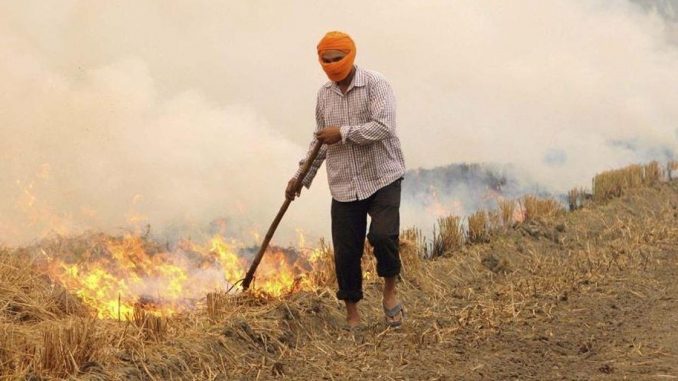
By Vishwa Mohan
NEW DELHI: Seeking to handle issue of stubble burning in a comprehensive and coordinated manner, the environment ministry has approved launching of a regional project to tackle the menace that adversely affects air quality and soil health. The project will be implemented in a phased manner under the National Adaptation Fund for Climate Change (NAFCC).
The first phase of the project, costing approximately Rs 100 crore, was approved on Thursday for Punjab, Haryana, Uttar Pradesh and Rajasthan.
Initially, awareness generation and capacity building activities will be undertaken to encourage farmers to adopt alternate practices which would also help diversify livelihood options and enhance farmers’ income.
“Based upon the performance in the first phase, the scope could be enhanced and more activities can be supported subsequently”, said the Union environment secretary C K Mishra who chaired the meeting of the National Steering Committee on Climate Change that approved the project.
“The project not only aims to mitigate climate change impacts and enhance adaptive capacity, but will also counter the adverse environmental impacts that arise from (stubble) burning”, said the environment ministry in a statement.
It said, “A slew of technological interventions will be undertaken for timely management of crop residue in addition to effective utilisation of existing machineries. Implementable and sustainable entrepreneurship models will be created in rural areas through upscaling successful initiatives and innovative ideas.”
The problem of crop residue burning has been intensifying over the years with Punjab, Haryana and Uttar Pradesh being the major stubble burning hotspots. It affects air quality in Delhi and National Capital Region (NCR) after every post-harvest season.
Increased mechanisation, declining number of livestock and absence of economically viable alternative to use crop residue are some of the reasons for residues burning.
An official said that the regional project to deal with the issue of stubble burning under the NAFCC would be in addition to what the high-level central task force has planned as part of its 12-point action agenda for abatement of air pollution in Delhi and NCR.
Pitching for coordinated action to combat stubble burning in Punjab, Haryana and UP, the task force has already asked secretaries of agriculture and rural development to implement the agreed plan for managing crop stubble.
It also asked the ministry to collaborate with the Department of Science & Technology to ensure that independent data on crop stubble burning is available in real time for timely action.
Two years after devising a 42-point action plan that failed to combat air pollution due to its poor implementation on the ground in Delhi and NCR, the high-level central task force on Tuesday came out with the 12-point action agenda asking environment ministry to take multiple measures to deal with the problem.
These measures include developing a dashboard of all the ‘Red’ category (high) polluting units in National Capital Region (NCR) and launching a mobile App where citizens can upload picture of violation for quick remedial action.
Besides, the ministry in coordination with states will also set up anti-pollution helpline in all NCR districts to register complaints of specific violations.
It is learnt that the central task force, headed by Nripendra Misra, principal secretary to the prime minister, will constantly monitor the implementation of all the suggested measures so that it do not meet the fate of what the 42-point action plan of the ministry had faced in the past two years.
The broad 12-point draft action agenda carries over 30 work points to be implemented in Delhi and NCR states. Majority of these work points are, however, simply taken out from the 42-point agenda which the ministry had prepared two years ago but failed to implement.
Referring to a plan to set up a dashboard for ‘Red’ category polluting units, an official explained that the step would help in round-the-clock centralised monitoring of such industries as each of these units would now have to install a certified pollution meter within their premises.
The ‘Red’ category of industries include thermal power plants, oil refinery, tanneries, automobile manufacturing, cement, pesticides, e-waste recyclers, big hotels, nuclear power plants and fertilizers among others.
The action agenda suggested strict action against brick kilns operating in the NCR region, especially in areas like Baghpat (UP) and Jhajjar (Haryana), without environmental clearance.
“The task force under the chairmanship of principal secretary to PM was, in fact, set up for better coordination and proper monitoring of all the action points considering involvement of different ministries and states in their implementation”, said an official.
The Union environment secretary will be responsible for overall coordination of the action agenda. The ministry, while seeking comments of stakeholders on its 12-point action agenda in next 15 days, however, clarified that the action to combat air pollution would not be limited to the agenda enlisted by it.
The action agenda also expected municipal corporations and urban development ministry to implement a strong “behaviour change campaign” involving resident welfare associations and market trader associations on proper management of solid waste to improve air quality.

Leave a Reply